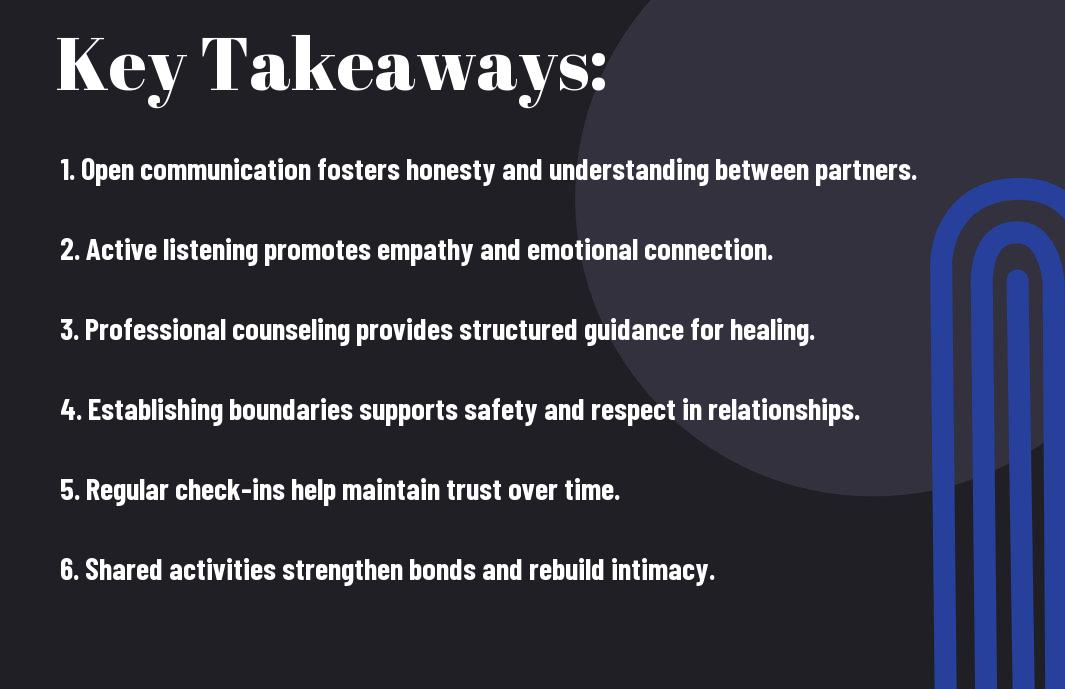Trust is the foundation of any strong marriage, and when it has been broken, it can feel overwhelming to restore. Understanding the tools and resources available to you is vital in navigating the complexities of rebuilding trust. Whether you are facing issues like betrayal, miscommunication, or emotional distance, you can find effective strategies that promote healing and intimacy. This guide will provide you with vital techniques and resources designed to help you and your partner foster understanding, forgiveness, and a renewed connection in your relationship.

Key Takeaways:
- Open and honest communication is vital for rebuilding trust; sharing feelings and concerns fosters a safe environment.
- Establishing consistent boundaries and respecting them can help restore security in the relationship.
- Seek professional help through counseling or workshops to gain expert insights and strategies for healing.
- Engage in trust-building exercises to promote teamwork and understanding, enhancing emotional connections.
- Forgiveness plays a key role in moving forward; both partners need to work through their feelings and let go of past grievances.
- Rebuilding trust takes time and patience; celebrate small milestones along the way to recognize progress.
- Focus on positive experiences together—quality time and shared activities can strengthen the bond and reinforce trust.

Understanding Trust in Marriage
The foundation of a healthy marriage rests on strong trust. When trust falters, you may experience feelings of insecurity and doubt, which can distort communication and intimacy within your relationship. It is necessary to recognize that trust is not merely about fidelity but also about reliability, emotional safety, and mutual respect. Building and maintaining this vital element requires a consistent effort from both partners to create an environment where vulnerability can thrive.
The Foundations of Trust
Between partners, trust is built through transparency, honesty, and open communication. These elements allow you to feel safe in sharing your thoughts, feelings, and experiences. When both of you honor commitments and show reliability, it strengthens the bond that allows trust to flourish over time. Additionally, nurturing emotional intimacy fosters a safe space for growth and connection.
Common Causes of Trust Issues
Understanding the roots of trust issues can help you address them effectively. Trust may be compromised due to various factors, including past betrayals, poor communication, or different expectations in your relationship. The absence of transparency often leads to misunderstandings, where assumptions replace open dialogue, creating a rift between you and your partner. Recognizing these patterns allows you to take proactive steps toward healing.
Even minor misunderstandings can escalate into significant trust issues if not addressed promptly. Past betrayals, whether from infidelity or other broken promises, can linger in your mind, causing fear and doubt. Additionally, poor communication may lead to repeated conflicts, where feelings remain unresolved. You might find yourself making assumptions about your partner’s actions or intentions, which can create a cycle of mistrust. By identifying these common causes, you can work together to build a stronger, more trustworthy foundation in your marriage.
Communication Strategies
If you want to rebuild trust in your marriage, effective communication is necessary. Making time for open discussions and addressing feelings can lead to deeper understanding and connection. Implementing strong communication strategies can pave the way for healing and foster a supportive environment where both partners can thrive.
Open and Honest Dialogue
Below, you’ll find that engaging in open and honest dialogue is vital for rebuilding trust in your relationship. This means sharing your feelings and thoughts without fear of judgment, allowing for emotional authenticity. Establish a safe space where both you and your partner can openly express yourselves, paving the way for a stronger bond.
Active Listening Techniques
Around relationships, active listening is a game-changer. It involves not just hearing but truly understanding your partner’s perspective. Practice techniques such as paraphrasing their words, asking clarifying questions, and maintaining eye contact to show that you value their feelings. This approach not only enhances your understanding but also demonstrates respect.
Honest engagement through active listening fosters an environment where both partners feel valued. By using techniques like paraphrasing, you ensure your partner feels heard, while asking clarifying questions shows genuine interest in their thoughts. Maintaining eye contact is also important; it bridges the emotional divide and strengthens your connection. Avoid interrupting, as this can undermine their feelings. When practiced regularly, these techniques can fortify trust and create a loving atmosphere in your marriage.

Rebuilding Connection
Keep in mind that rebuilding connection in your marriage requires intentional effort and commitment from both partners. Open communication, vulnerability, and active listening are important to rekindle the bond you once shared. Prioritizing your relationship and being open to change can help you navigate this journey together.
Strengthening Emotional Bonds
After a challenging period, it’s important to focus on strengthening emotional bonds with your spouse. This can involve practicing empathy, sharing feelings, and validating each other’s experiences. By fostering an environment where both partners feel understood and supported, you can pave the way for deeper emotional intimacy.
Quality Time and Shared Experiences
Between daily routines and responsibilities, spending quality time together can often be overlooked. Make the effort to prioritize your relationship by engaging in activities that you both enjoy, whether it’s a date night or simply cooking together. These shared experiences can reignite your connection and help you form lasting memories.
Connection is vital to a thriving marriage, and dedicating time to shared experiences can make all the difference. Explore new hobbies together or revisit activities you used to enjoy as a couple. This not only helps break the routine of everyday life but also fosters a sense of teamwork and unity. Through these shared moments, you can create a stronger foundation for your relationship, leading to increased intimacy and a deeper understanding of one another.
Professional Support
Many couples find that engaging with professional support can significantly enhance their journey towards rebuilding trust in their marriage. With trained therapists and counselors, you can explore underlying issues, improve communication skills, and develop strategies to strengthen your relationship. This outside perspective and guidance can equip you with the necessary tools to navigate challenges together.
Couples Therapy and Counseling
Counseling can provide a safe space for you and your partner to discuss feelings and experiences that may have caused a rift in your marriage. Through guided sessions, you will learn to articulate your emotions, understand each other’s perspectives, and work toward mutual goals. This process not only fosters healing but also encourages an open dialogue that strengthens your bond.
Support Groups and Workshops
At support groups and workshops, you get the chance to connect with others facing similar challenges. These environments foster a sense of community and understanding, where sharing experiences can lead to invaluable insights. Interactive sessions often provide practical tools and techniques to help you rebuild trust, making you feel less isolated in your journey towards marital healing.
Therapy in support groups and workshops can be a transformative experience. These gatherings allow you to exchange stories and learn from others who are navigating similar situations. By sharing your experiences, you gain empathy and a wider perspective on challenges. Additionally, skilled facilitators introduce effective strategies to foster connection, communication, and understanding, which are key to rebuilding trust in your relationship. These shared experiences can also create a sense of accountability, pushing you toward lasting change.
Tools for Personal Growth
All relationships require individual growth to thrive, and embracing personal development is necessary for rebuilding trust in your marriage. By focusing on your own emotional health and self-awareness, you can contribute positively to the dynamic between you and your partner. Utilizing effective tools for personal growth empowers you to make significant changes that will benefit both yourself and your union.
Individual Reflection and Journaling
On your journey to rebuild trust, individual reflection and journaling become invaluable practices. Setting aside time to explore your thoughts and feelings on paper offers clarity and understanding, allowing you to process your emotions and recognize patterns in your behavior. This practice not only enhances your self-awareness but also lays the foundation for healthier communication within your marriage.
Self-improvement Techniques
Reflection involves actively seeking ways to elevate your personal growth, which can significantly impact your marriage. Engaging in self-improvement techniques like setting realistic goals, seeking feedback, and practicing mindfulness can foster emotional resilience and awareness. By developing these skills, you can better navigate the challenges of rebuilding trust and ultimately create a more fulfilling partnership.
Understanding self-improvement techniques is key in your personal growth journey. Techniques such as setting specific goals, engaging in feedback loops, and practicing mindfulness help you identify areas needing change. By prioritizing these practices, you cultivate a deeper understanding of your emotions and behaviors. This not only promotes personal healing but also enhances your ability to communicate effectively with your partner. As you commit to growth, you pave the way for renewed trust and intimacy in your marriage.
Implementing Change
Unlike what many might think, rebuilding trust in a marriage requires consistent and intentional effort. You can begin this transformative journey with tools like the Rebuilding Trust Roadmap Course, which offers structured guidance and actionable steps to foster trust and emotional safety within your relationship.
Setting Realistic Goals
Implementing change in your marriage begins by setting realistic goals that you and your partner can work towards together. Focus on specific, achievable objectives that can help you establish a foundation of trust. By breaking down larger issues into manageable steps, you can create a roadmap that allows both partners to feel invested in the change process.
Tracking Progress and Celebrating Success
Behind every meaningful shift in your relationship lies a commitment to tracking progress and honoring achievements, no matter how small. This practice helps you identify how far you’ve come and reinforces positive behavior.
With each milestone you reach, it’s necessary to celebrate your successes together, reinforcing the idea that change is possible. This could involve acknowledging moments of vulnerability, communication breakthroughs, or simply recognizing each other’s efforts. By creating a culture of positivity, you not only solidify your connection but also enhance your motivation to continue on the path of rebuilding trust. Continual recognition of progress fosters a strong bond, while addressing setbacks constructively contributes to growth and resilience in your marriage.
Final Words
Summing up, rebuilding trust in your marriage requires commitment, communication, and the right tools. By utilizing resources such as counseling, effective communication techniques, and trust-building exercises, you can effectively navigate through challenges and strengthen your relationship. It’s crucial to approach this journey with patience and openness, allowing both you and your partner to heal and grow together. With dedication and the appropriate support, restoring trust can lead to a more resilient and fulfilling partnership.
FAQ
Q: What are some effective tools for rebuilding trust in a marriage?
A: Rebuilding trust in a marriage often requires open communication, empathy, and consistent actions. Key tools include engaging in honest discussions about feelings and concerns, participating in couples therapy or relationship workshops, establishing trust-building activities such as spending quality time together, and practicing transparency in daily interactions. Journaling can also help both partners express their thoughts constructively.
Q: How long does it typically take to rebuild trust in a relationship?
A: The timeline for rebuilding trust varies widely among couples, depending on the circumstances that led to the broken trust and the commitment of both partners to the process. While some couples may see improvement in weeks, others might take several months or even years. Progress often involves continuous effort, open dialogue, and a willingness to address underlying issues together.
Q: Is couples therapy a good option for rebuilding trust in marriage?
A: Yes, couples therapy can be a highly beneficial option for rebuilding trust. A trained therapist provides a safe space for both partners to express their feelings and thoughts, while offering guidance on effective communication strategies. Therapists can help couples identify patterns of behavior that contribute to mistrust and facilitate discussions that promote healing, understanding, and reconnection.
Q: What role does forgiveness play in rebuilding trust?
A: Forgiveness is a significant component of rebuilding trust in a marriage. It allows partners to move past the hurt and betrayal, creating an opportunity for healing. However, forgiveness should be approached with caution—it requires both partners to actively work towards understanding the pain caused and committing to positive changes. Forgiveness does not mean forgetting; rather, it’s about letting go of resentment while fostering a space for growth.
Q: Can trust be fully restored after significant breaches, such as infidelity?
A: It is possible for trust to be restored after significant breaches, such as infidelity, but it typically requires extensive work from both partners. This involves honest communication about the events that occurred, a commitment to transparency, and the willingness to rebuild emotional intimacy. The process can be challenging, but with dedication, patience, and support, many couples find a path toward renewed trust and a stronger relationship.
